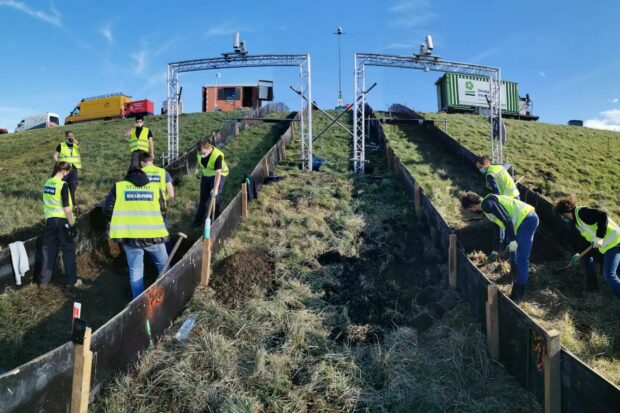
Climate change is already affecting the countries bordering the southern North Sea and English Channel. Known as the 2 seas region, we need to proactively adapt and protect the area from rising sea levels and heavy storms which are occurring more and more frequently.
The Environment Agency, together with 12 partners from England, Belgium, France and the Netherlands has been working to do that through the Polder2C’s project which aims to improve the regions’ capacity to adapt to the challenges caused by climate change.
A unique ‘living lab’
Polders are tracts of low-lying land that have been re-claimed either from rivers or the sea. The Hedwigepolder in the Netherlands and the adjacent part of the Flemish Prosperpolder form the largest tidal area in Western Europe. The flooding of the polders and the realignment of the existing flood embankments further inland provides a unique 6km2 living laboratory where we have the opportunity to test flood embankments, in extreme conditions, in a real world setting.
With rising sea levels and extreme weather conditions, it is important to understand how this new climate may impact our flood defences; how we maintain and repair them and how we carry out flood incident response.
The Polder2Cs project is helping in the development of appropriate climate-response strategies and knowledge sharing. It focuses on three main areas:
- Flood Defences – to carry out research on the strength of flood embankments by testing, validating and demonstrating where potential improvements to design and maintenance could be of benefit.
- Emergency Response – to learn from others and design new and better emergency response plans
- Knowledge Infrastructure – to formalise knowledge transfer and educate the next generation of water managers
Enhancing our knowledge, testing innovative approaches
The threats posed by climate change are a global challenge and we are not facing them alone. We are proud to be a partner on the Polder 2C’s project. It is a part of our commitment made in our FCERM Strategy to become a world leader in the research and innovation of flood and coastal risk management. The project will help us to be better prepared by:
- Enhancing our knowledge into the behaviour of flood defences under extreme circumstances, as well as their failure characteristics.
- Testing innovative and new solutions to maintain and repair flood embankments
- Contributing updates to the International Levee Handbook which is a collection of international good practice and guidance on the design, construction, maintenance and improvement of levees (flood embankments).
Highlights from the past year
We’ve been busy in the past year and working through the pandemic has presented particular challenges as the project lies on the border between Belgium and the Netherlands.
For experiments to continue we’ve been balancing the restrictions of both countries – taking into account travel restrictions, closed borders and hygiene and social distancing rules for each country.
An example of how we carry out experiments to replicate storm conditions on existing flood embankments is via a wave overtopping simulator. This machine replicates local severe storm conditions by adjusting wave volumes and frequency.
Wave overtopping tests primarily simulate conditions experienced by coastal or estuarine embankments. Using this, we can investigate how factors such as vegetation maintenance strategies, animal burrows and droughts have on embankment resilience.
Some of the highlights of the work we’ve undertaken in the past year include:
- Developing a damage reporting app prototype for members of the public.
- Overflow tests of different erosion scenarios, such as the impacts of trees on embankments, as well as overflow tests to assess the effectiveness of repair measures.
- Embankment repair – as well a testing the performance of embankment repairs, we also monitored the ease of carrying out repairs, skill sets required, timescales and the machinery/tools required.
- Levee challenge assignment – MSc students and their coaches from across the world were asked to repair the outer slope of a damaged grass covered embankment with their own innovative and durable protection measures.
- Winter school - a one-week event for PhD and MSc students from around the world to attend in-class and field training and research. The Environment Agency participated by holding a class on UK flood incident management.
Coming next
This winter’s programme of experiments is currently being finalised. However, the outline programme indicates the following experiment opportunities for 2021-22:
- Erosion caused by other structures on and around embankments such as concrete staircases
- Performance of different repair options such alternative clay and seed mix repairs, geotextiles and fibre mats,
- Different methods of identifying and monitoring the extent of damage on flood embankments caused by burrowing animals.
- Erosion tests around damage in flood embankments caused by burrowing animals
- Impact of different vegetation types found on flood embankments such as reeds
- Winter school and levee challenge assignment for this year’s cohort of students.
Visit the website and watch our video to find out more about the Polder2C’s project
INTERREG 2 SEAS Mers Zeeën
This project has received funding from the Interreg 2 Seas programme 2014-2020 co-funded by the European Regional Development Fund under subsidy contract No [2S07-023].
Partners of Polder2C’s Programme
A total of thirteen partners are involved in the Interreg 2 Seas programme 2014-2020 subsidy application: Department of Mobility and Public Works/Flanders Hydraulics Research and Catholic University Leuven (KU Leuven) from Belgium, Environment Agency and South West Water from England, Cerema, ISL Engineering and University of Lille from France and Delft University of Technology, Ministry of Infrastructure and Water management (RWS), Province of Zeeland, HZ University Of Applied Sciences, Ministry of Defence and the Foundation of Applied Water Research (STOWA) from the Netherlands.

Leave a comment